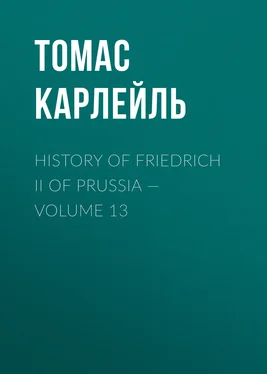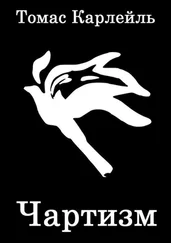Томас Карлейль - History of Friedrich II of Prussia — Volume 13
Здесь есть возможность читать онлайн «Томас Карлейль - History of Friedrich II of Prussia — Volume 13» — ознакомительный отрывок электронной книги совершенно бесплатно, а после прочтения отрывка купить полную версию. В некоторых случаях можно слушать аудио, скачать через торрент в формате fb2 и присутствует краткое содержание. Жанр: foreign_prose, История, literature_19, foreign_edu, foreign_antique, на английском языке. Описание произведения, (предисловие) а так же отзывы посетителей доступны на портале библиотеки ЛибКат.
- Название:History of Friedrich II of Prussia — Volume 13
- Автор:
- Жанр:
- Год:неизвестен
- ISBN:нет данных
- Рейтинг книги:5 / 5. Голосов: 1
-
Избранное:Добавить в избранное
- Отзывы:
-
Ваша оценка:
- 100
- 1
- 2
- 3
- 4
- 5
History of Friedrich II of Prussia — Volume 13: краткое содержание, описание и аннотация
Предлагаем к чтению аннотацию, описание, краткое содержание или предисловие (зависит от того, что написал сам автор книги «History of Friedrich II of Prussia — Volume 13»). Если вы не нашли необходимую информацию о книге — напишите в комментариях, мы постараемся отыскать её.
History of Friedrich II of Prussia — Volume 13 — читать онлайн ознакомительный отрывок
Ниже представлен текст книги, разбитый по страницам. Система сохранения места последней прочитанной страницы, позволяет с удобством читать онлайн бесплатно книгу «History of Friedrich II of Prussia — Volume 13», без необходимости каждый раз заново искать на чём Вы остановились. Поставьте закладку, и сможете в любой момент перейти на страницу, на которой закончили чтение.
Интервал:
Закладка:
To a modern English reader it is very strange, that Austrian scene of things in which poor Robinson is puffing and laboring. The ineffable pride, the obstinacy, impotency, ponderous pedantry and helplessness of that dull old Court and its Hofraths, is nearly inconceivable to modern readers. Stupid dilapidation is in all departments, and has long been; all things lazily crumbling downwards, sometimes stumbling down with great plunges. Cash is done; the world rising, all round, with plunderous intentions; and hungry Ruin, you would say, coming visibly on with seven-league boots: here is little room for carrying your head high among mankind. High nevertheless they do carry it, with a grandly mournful though stolid insolent air, as if born superior to this Earth and its wisdoms and successes and multiplication-tables and iron ramrods,—really with "a certain greatness," says somebody, "greatness as of great blockheadism" in themselves and their neighbors;—and, like some absurd old Hindoo Idol (crockery Idol of Somnauth, for instance, with the belly of him smashed by battle-axes, and the cart-load of gold coin all run out), persuade mankind that they are a god, though in dilapidated condition. That is our first impression of the thing.
But again, better seen into, there is not wanting a certain worthily steadfast, conservative and broad-based high air (reminding you of "Kill our own mutton, Sir!" and the ancient English Tory species), solid and loyal, though stolid Ancient Austrian Tories, that definition will suffice for us;—and Toryism too, the reader may rely on it, is much patronized by the Upper Powers, and goes a long way in this world. Nay, without a good solid substratum of that, what thing, with never so many ballot-boxes, stump-orators, and liberties of the subject, is capable of going at all, except swiftly to perdition? These Austrians have taken a great deal of ruining, first and last! Their relation to the then Sea-Powers, especially to England embarked on the Cause of Liberty, fills one with amazement, by no means of an idolatrous nature; and is difficult to understand at all, or to be patient with at all.
Of disposition to comply with Prussia, Robinson finds, in spite of Mollwitz and the sad experiences, no trace at Vienna. The humor at Vienna is obstinately defiant; simply to regard Friedrich as a housebreaker or thief in the night; whom they will soon deal with, were they once on foot and implements in their hand: "Swift, ye Sea-Powers; where are the implements, the cash, that means implements?" The Young Hungarian Majesty herself is magnificently of that opinion, which is sanctioned by her Bartensteins and wisest Hofraths, with hardly a dissentient (old Sinzendorf almost alone in his contrary notion, and he soon dies). Robinson urges the dangers from France. No Hofrath here will allow himself to believe them; to believe them would be too horrible. "Depend upon it, France's intentions are not that way. And at the worst, if France do rise against us, it is but bargaining with France; better so than bargaining with Prussia, surely. France will be contentable with something in the Netherlands; what else can she want of us? Parings from that outskirt, what are these compared with Silesia, a horrid gash into the vital parts? And what is yielding to the King of France, compared with yielding to your Prussian King!"—
It is true they have no money, these blind dull people; but are not the Sea-Powers, England especially, there, created by Nature to supply money? What else is their purpose in Creation? By Nature's law, as the Sun mounts in the Ecliptic and then falls, these Sea-Powers, in the Cause of Liberty, will furnish us money. No surrender; talk not to me of Silesia or surrender; I will die defending my inheritances: what are the Sea-Powers about, that they do not furnish more money in a prompt manner? These are the things poor Robinson has to listen to: Robinson and England, it is self-evident at Vienna, have one duty, that of furnishing money. And in a prompt manner, if you please, Sir; why not prompt and abundant?
An English soul has small exhilaration, looking into those old expenditures, and bullyings for want of promptitude! But if English souls will solemnly, under high Heaven, constitute a Duke of Newcastle and a George II. their Captains of the march Heavenward, and say, without blushing for it, nay rejoicing at it, in the face of the sun, "You are the most godlike Two we could lay hold of for that object,"—what have English souls to expect? My consolation is, and, alas, it is a poor one, the money would have been mostly wasted any way. Buy men and gunpowder with your money, to be shot away in foreign parts, without renown or use: is that so much worse than buying ridiculous upholsteries, idle luxuries, frivolities, and in the end unbeautiful pot-bellies corporeal and spiritual with it, here at home? I am struck silent, looking at much that goes on under these stars;—and find that misappointment of your Captains, of your Exemplars and Guiding and Governing individuals, higher and lower, is a fatal business always; and that especially, as highest instance of it, which includes all the lower ones, this of solemnly calling Chief Captain, and King by the Grace of God, a gentleman who is NOT so (and SEEMS to be so mainly by Malice of the Devil, and by the very great and nearly unforgivable indifference of Mankind to resist the Devil in that particular province, for the present), is the deepest fountain of human wretchedness, and the head mendacity capable of being done!—
As for the brave young Queen of Hungary, my admiration goes with that of all the world. Not in the language of flattery, but of evident fact, the royal qualities abound in that high young Lady; had they left the world, and grown to mere costume elsewhere, you might find certain of them again here. Most brave, high and pious-minded; beautiful too, and radiant with good-nature, though of temper that will easily catch fire: there is perhaps no nobler woman then living. And she fronts the roaring elements in a truly grand feminine manner; as if Heaven itself and the voice of Duty called her: "The Inheritances which my Fathers left me, we will not part with these. Death, if it so must be; but not dishonor:—Listen not to that thief in the night!" Maria Theresa has not studied, at all, the History of the Silesian Duchies; she knows only that her Father and Grandfather peaceably held them; it was not she that sent out Seckendorf to ride 25,000 miles, or broke the heart of Friedrich Wilhelm and his Household. Pity she had not complied with Friedrich, and saved such rivers of bitterness to herself and mankind! But how could she see to do it,—especially with little George at her back, and abundance of money? This, for the present, is her method of looking at the matter; this magnanimous, heroic, and occasionally somewhat female one.
Her Husband, the Grand Duke, an inert, but good-tempered, well-conditioned Duke after his sort, goes with her. Him we shall see try various things; and at length take to banking and merchandise, and even meal-dealing on the great scale. "Our Armies had most part of their meal circuitously from him," says Friedrich, of times long subsequent. Now as always he follows loyally his Wife's lead, never she his: Wife being, intrinsically as well as extrinsically, the better man, what other can he do?—Of compliance with Friedrich in this Court, there is practically no hope till after a great deal of beating have enlightened it. Out of deference to George and his ardors, they pretend some intention that way; and are "willing to bargain, your Excellency;"—no doubt of it, provided only the price were next to nothing!
And so, while the watchful edacious Hyndford is doing his best at Strehlen, poor Robinson, blown into triple activity, corresponds in a boundless zealous manner from Vienna; and at last takes to flying personally between Strehlen and Vienna; praying the inexorable young Queen to comply a little, and then the inexorable young King to be satisfied with imaginary compliance; and has a breathless time of it indeed. His Despatches, passionately long-winded, are exceedingly stiff reading to the like of us. O reader, what things have to be read and carefully forgotten; what mountains of dust and ashes are to be dug through, and tumbled down to Orcus, to disengage the smallest fraction of truly memorable! Well if, in ten cubic miles of dust and ashes, you discover the tongue of a shoe-buckle that has once belonged to a man in the least heroic; and wipe your brow, invoking the supernal and the infernal gods. My heart's desire is to compress these Strehlen Diplomatic horse-dealings into the smallest conceivable bulk. And yet how much that is not metal, that is merely cinders, has got through: impossible to prevent,—may the infernal gods deal with it, and reduce Dryasdust to limits, one day! Here, however, are important Public News transpiring through the old Gazetteers:—
Читать дальшеИнтервал:
Закладка:
Похожие книги на «History of Friedrich II of Prussia — Volume 13»
Представляем Вашему вниманию похожие книги на «History of Friedrich II of Prussia — Volume 13» списком для выбора. Мы отобрали схожую по названию и смыслу литературу в надежде предоставить читателям больше вариантов отыскать новые, интересные, ещё непрочитанные произведения.
Обсуждение, отзывы о книге «History of Friedrich II of Prussia — Volume 13» и просто собственные мнения читателей. Оставьте ваши комментарии, напишите, что Вы думаете о произведении, его смысле или главных героях. Укажите что конкретно понравилось, а что нет, и почему Вы так считаете.









